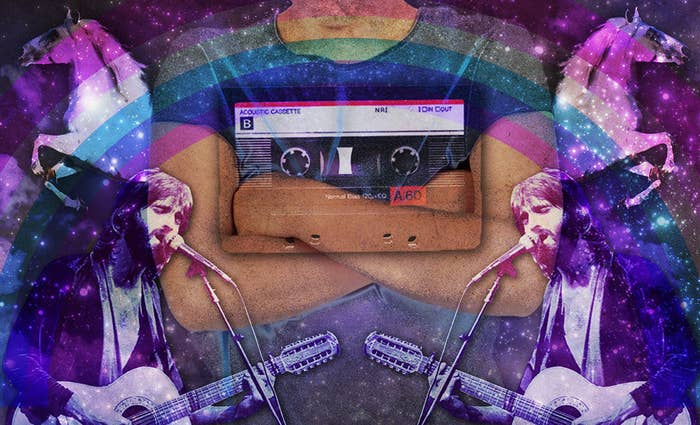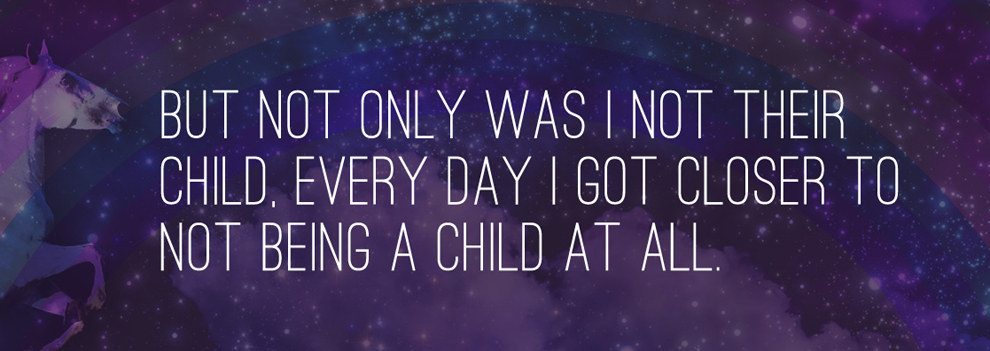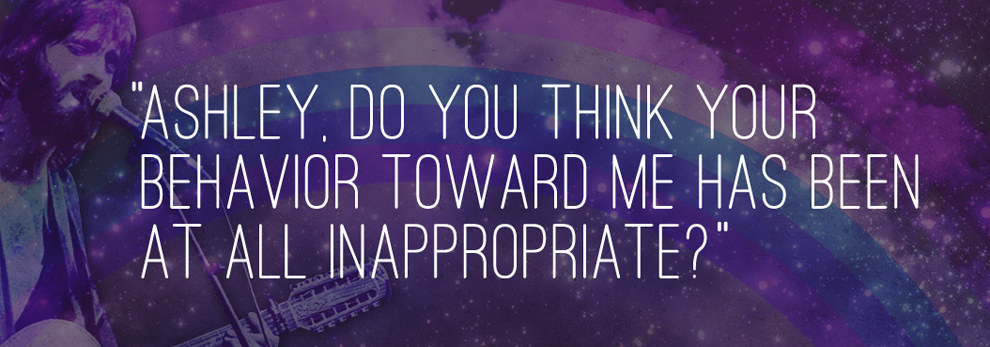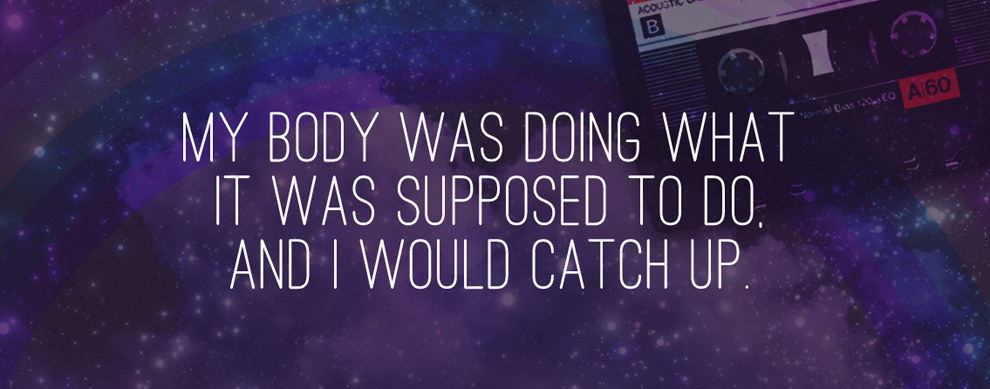
The men in my life noticed my body was changing before I did. Suddenly, at 13, the parts of me I had largely ignored made people uncomfortable. And in some cases, downright angry. I was walking home from school when a man pulled his car over and asked me for my phone number. I told him how old I was and he spat on the ground next to my feet.
"Go home and tell your mama she needs to be dressing you like you're 13. You almost didn't get treated like somebody's child." He sped off.
I stood there, shaking, gaping at my jeans and T-shirt. What about my clothes said I wasn't 13? What about me kept telling the rest of the world I wasn't a child? My mother told me, more than once when I was growing up, if a man ever put his hands on me, she'd kill him. I walked home, already knowing I wouldn't tell her what just happened. I believed her.
The same day, my mother laid my Christmas wish list on the kitchen counter between us. This is how we discussed most things, her on one side of the counter, and me on the other. She set her cigarette in an ashtray made of tin foil.
"Are you serious with this?" she said, reaching for another cigarette.
My eyesight was poor enough that my own handwriting was basically illegible. I put the list closer to my face and reread it. She took a drag without taking her eyes off of me. I sat the list back on the counter, folded my arms over my chest, and nodded. Everything was there. She pointed to a few items on the list.
"You want a teddy bear, a coloring book, and a Kenny Loggins album? Who is Kenny Loggins?"
"He's just a singer. I like some of his songs."
My mother narrowed her eyes, waiting for me to elaborate. She knew who Kenny Loggins was. What she didn't know was why her 13-year-old daughter was asking for the greatest hits CD of a '70s/'80s yacht-rock legend. My mother had a habit of clinging to the belief that because she'd given birth to me, I was incapable of keeping secrets from her. This usually worked in my favor. If I was quiet, she'd come up with her own theories about strange behaviors or how I discovered things she hadn't personally introduced me to, and she would be satisfied. So, I remained silent, tugging on the bottom of my shirt so it covered the bare half-inch below my navel.

Every child who grows up without a father reacts differently to the fact. There is no one behavior that can be exclusively attributed to what some call "fatherlessness." My father had been in prison since I was 6 months old, but due to the letters and cards he wrote me, I never felt lacking in love from him.
Still, I felt the absence of his physical presence in my life. He was not there to embarrass me with bad jokes in front of my friends or look at me with disappointment. There was no way to tell him about the small victories or catastrophes in my budding young adult life. In some ways, I was grateful. My father didn't have to see what was happening to my body, that it was growing wildly, and how powerless I was to stop it. I could still be his little girl.
My desire for a physical representation of my father's love led to me pursuing other "fathers." They weren't all aware of their father status, and they weren't all men, but they were all important to me. Together, they made up the perfect father: proud of me, hard on me, and charmed by me. They were my Danny Tanners, Carl Winslows, and Cliff Huxtables. But not only was I not their child, every day I got closer to not being a child at all.
I'd been afraid of the dark for as long as I could remember, but only recently had my mother become adamant about my brother and I not sleeping in her room. It was my fear of the dark that prompted Mr. Mason, my computer teacher, to give me a tape of songs by Kenny Loggins. The album was called Return to Pooh Corner and it was all lullabies. This was his solution to me falling asleep in his class, and it cemented my view of him as a perfect parental unit. After class, he handed it to me.
"Ashley, just play it while you sleep at first," he said. "Then try playing it with just your closet light on. Then try playing it with no lights on. It helped my daughter when she was little. It might help you too."
I took it home and played it every night just like he said. I lay there and I listened to Kenny sing about ponies, the "Rainbow Connection," and Winnie the Pooh. Things I understood to be pure in their representation of childhood. Mr. Mason could have sent me to in school detention for sleeping in class. He wouldn't have been the first, and I would have slept there anyway. But he helped me. He didn't just help me, he gave me a tape that meant something to him, a tape that had belonged to his own real daughter. I replayed the moment in my head, lilting melodies in the background, unassuming and understanding.
A week later, my mother stopped me as I climbed into the car.
"You need to change your shirt." It was my favorite shirt — denim with puffy sleeves and a mostly Lycra bodice. It was tighter than it had been three months ago, but still pretty, and still my favorite. I dragged my feet on the return to the house. The rest of the family was already in the car, my grandmother in the passenger seat shaking her head. She turned to my mother, "When did she get so…big?"
My mother sunk into the driver's seat, watching me walk away. "I don't know. But it's only a matter of time until I have to choke somebody for looking at her."
I let the screen door slam, walking quickly toward my room. I grabbed a long white T-shirt in the from my top drawer, something I usually slept in. I changed out of my jeans and into baggy overalls. Nothing to see here. Nothing to touch. I took my Kenny Loggins tape out of my tape player and put it in my front pocket, right in the center of my chest. Still with me.

By the end of the week, another teacher with father status, Mr. Unway, asked me to stay after class.
"Ashley, do you think your behavior toward me has been at all inappropriate?"
Inappropriate. I hated that word. It always meant that the breasts I hadn't asked for were moving too freely, my most comfortable shorts were too small around my ever-growing thighs, or my body was betraying me in some other way. I'd never been asked if my behavior was inappropriate in the way he just asked. I answered truthfully.
"No."
"Do you think that hanging out in my classroom before or after class in small clothes is something a nice girl would do?"
Instinctively, I wrapped my arms around myself. My clothes weren't small. They were a little tight. That was only because my body kept growing, but only in certain places. I did my best to cover myself, to hide it, to keep looking like someone's little girl, but I was visibly losing the battle, and had been for some time. It wasn't just me. We were all changing. I enjoyed watching the other girls in the locker room undress, and I kept track of their growth. But I didn't want to make them feel like I felt. I didn't want to make them feel ogled. Did they hate this too?
Mr. Unway seemed to realize how uncomfortable I'd gotten and asked if I'd come speak to the principal about this with him. I followed him out of the classroom, and into the hallway. He walked five steps ahead of me, and as we rounded the corner toward the principal's office, I spun around and walked in the opposite direction. By the time he called out for me, I was already running toward home and my tape player.

When Mr. Mason asked why I didn't come around anymore, I made something up about babysitting my siblings. He had been kind to me. He helped me. But I was not his daughter. It seemed any kindness that existed between us was bound to be tainted by how I looked and how that made any interaction between us seem rife with the potential for wrongdoing. It was evident that who I was inside, who I wanted to be, didn't match the intentions of my body. Outside, there was no little girl to be loved innocently. My body was a barrier.
I took solace in the tape that helped me get over my fear of the dark. Kenny sang to me the way I wanted my fathers to speak to me — with wisdom and love and the belief that I could still be innocent. I gave up on them, but I couldn't give up on the man whose voice could find me without looking for me. This wouldn't always be true because it couldn't always be true. My body was doing what it was supposed to do, and I would catch up. I wished no one would have to watch this happen.
That was the beauty of Kenny's music. I could grow up and never have to grow away from this safe space. The voice on my tape, a celluloid dream or memory track, didn't know me in real life. He would never have to watch me grow up. He would never have to consider me appropriate. He only had to sing and remind me I was still here, in this body. Every part of me was still here.
